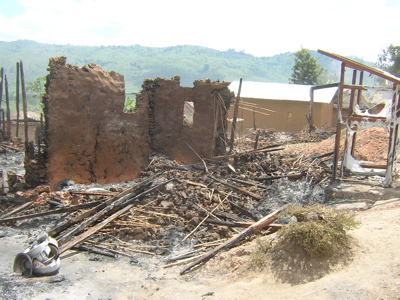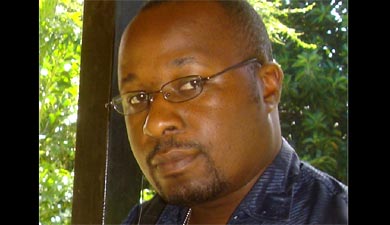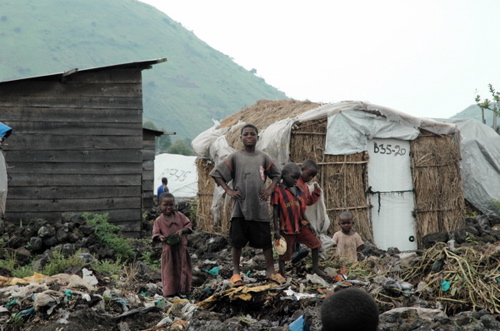The International Crisis Group's latest report, "Congo: A Stalled Democratic Agenda," scrutinizes the four year presidency of Joseph Kabila, calls it a failure, and warns that DRC risks anarchy without democracy and institutional reform.
Nearly four years after Joseph Kabila won the presidency in elections hailed as a milestone in the peace process, power is being centralised at the presidential office, checks and balances barely exist, and civil liberties are regularly undermined, despite growing signs that the regime is unable to manage local conflicts. The Congo's partners must place democratisation and institutional reform at the centre of their dialogue with Kabila's government.
 Credit HRW
Credit HRW
The release of this report coincides with the announcement by the State Department that U.S. Assistant Secretary for African Affairs Johnnie Carson is traveling to France, the Republic of Congo (Brazzaville), Democratic Republic of the Congo (Kinshasa), and the United Kingdom from April 8 to April 19. In DRC, Carson has requested meetings with President Joseph Kabila and Foreign Minister Alexis Thambwe Mwamba, among others. In addition to meeting with Embassy staff, Carson will travel to Kisangani to visit a U.S.-funded training mission for a Congolese light infantry battalion. "The mission is a collaboration between the State Department and AFRICOM as part of our effort to further the professionalization of the Congolese military," says DOS.
Carson's visit is a follow-up to SOS Hillary Clinton's 2009 meeting with Kabila. Not much has changed since then for the Congolese people.
There are no such things as coincidences in foreign affairs and it is curious that ICG has released the full report only in French. A call to the London office this morning revealed that it may be four or five weeks before the English translation is ready. It is unfortunate, because non-francophone journalists are reduced to reading the ICG summary--this oversight comes from an international organization with the ear of the United Nations and an annual budget of $15.5 million.
Still this is an important report and echoes the warning issued by Human Rights Watch in the report "We Will Crush You," which details the brutalities exacted on the Congolese people by Kabila from his election in 2004 until at least 2008. The 96-page report documents the Kabila government's use of violence and intimidation to eliminate political opponents. Human Rights Watch found that Kabila himself set the tone and direction by giving orders to "crush" or "neutralize" the "enemies of democracy," implying it was acceptable to use unlawful force against them.
The ICG media release accuses the Kabila regime of curtailing the powers of the government, parliament and the judiciary, and encouraging corruption that prevails among the elite. Corruption is not news, but it is good that ICG is coming out and warning that local elections will fail.
Preparations for local elections face major hurdles since Kabila "has increased intimidation of dissenters, showing a clear authoritarian trend," ICG says.
"Meanwhile, the international community has remained mostly silent."
One might say that eastern Congo is already in anarchy, but Congo has faded from the headlines in recent months. The situation in Congo since the December 2009 passage by the United Nations Security Council of Resolution 1906 continues to deteriorate. Rwandan rebels (FDLR), ex-CNDP troops, uncontrolled Congolese Army (FARDC) cadres and other renegade armed groups continue to be accused of armed ambush, robbery and illegal tax collections, kidnapping for ransom, looting of vehicles, rape, torture, mutilations, and the murder of journalists.
Kabila is now contemplating amending the constitution. Invoking sovereignty, he has called for the UN Mission (MONUC) to withdraw by summer 2011 and has announced that the Congolese government will take charge of organizing the presidential elections scheduled for late 2011.
Thierry Vircoulon, ICG's Central Africa Project Director, is calling upon international donors to link development aid to democratic transformation. An interesting choice of words, but it has seldom worked in Africa before, with billions of international aid vanishing into black hole upon black hole of corruption.
Meanwhile, the UN is condemning the recent killing of a freelance television journalist in the eastern part of the DRC. Patient Chebeya Bankome, known as Montigomo, was shot dead by three men in military uniform in his home in the city of Beni on April 5, according to a news release issued by the UN Educational, Scientific and Cultural Organization (UNESCO).
The 35-year-old reporter and freelance cameraman worked for several television broadcasters in North Kivu province. Monday's murder brings to six the number of journalists killed in eastern Congo, including Pascal Kabungulu, Serge Maheshe, Patrick Kikuku, Didace Namujimbo and Bruno Koko Chirambiza. Maheshe was killed in 2007 and I remember meeting him when I was a MONUC accredited journalist there. It sticks in the mind that justice has not been served for anyone, let alone journalists working in the Kivus.

Serge Maheshe
With wanted war criminal Bosco Ntaganda still running amuck in eastern Congo, INTERPOL has thrown its energy behind saving Gorillas instead of steadfastly hunting guerillas and saving people. A joint UN-issued report, "The Last Stand of the Gorilla - Environmental Crime and Conflict in the Congo Basin" suggests that gorillas may disappear across much of the Congo Basin by the mid 2020s unless action is taken to protect against poaching and habitat destruction.
In a maddening skewing of priorities, the report in part blames the 1.2 million IDPs for increasing pressure on natural resources, including forest habitat for gorillas.

Blame Them
I love gorillas. I have done much research on them. They are magnificent and should be protected. But considering what is happening in Congo, to put the onus on the backs of millions of people who have been brutalized by the corrupt regime of Joseph Kabila is myopic if not immoral. To blame "rapidly rising populations" of humans seems to be yet another call by environmentalists for depopulation of Central Africa.
And so the sad, sad story of Congo continues. Brutalize and intimidate the population so they are afraid to vote, allow the war criminals to operate with impunity, kill the journalists who try desperately to report on it, and send diplomats to prostrate themselves at Kabila's feet, begging for mercy for the beleaguered people of Congo.
You would think AFRICOM and INTERPOL could get a handle on things. The question to ask is why have they and the United Nations failed to bring any relief to these people?
And still, the international community is silent.
